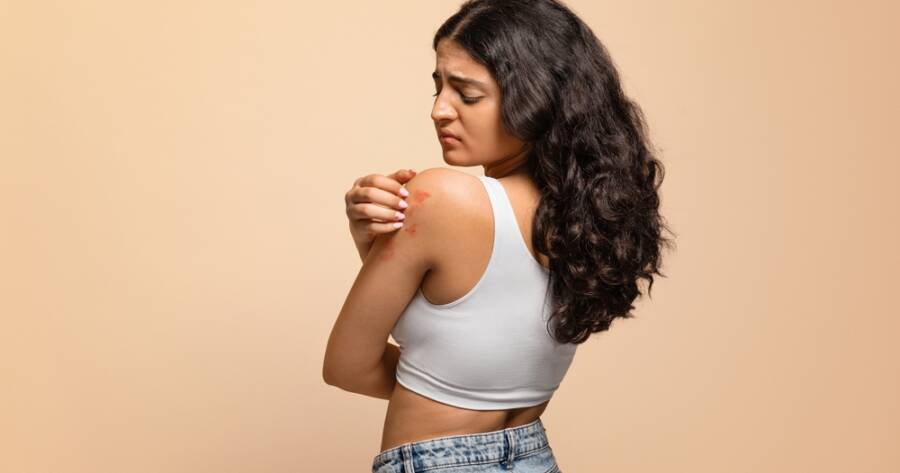Atopic dermatitis, also called eczema, is a common skin condition that causes redness, itching, and irritation. It can affect people of all ages, but it often starts in childhood. The exact cause is unknown, but genetics, immune system issues, and environmental factors play a role. While there is no cure, many treatments can help manage symptoms. Understanding this condition is important for those affected and their families.
What Causes Atopic Dermatitis?
Doctors do not know exactly what causes atopic dermatitis, but several factors can increase the risk. A person is more likely to develop it if they have a family history of eczema, asthma, or allergies. The immune system also plays a role by overreacting to irritants, causing inflammation. Environmental triggers such as pollen, pet dander, or harsh soaps can make symptoms worse.
People with atopic dermatitis often have a weak skin barrier, which allows moisture to escape and irritants to enter. This makes the skin dry, sensitive, and prone to infections. Stress, cold weather, and certain foods can also trigger flare-ups.
Symptoms and How It Affects Daily Life
The main symptom of atopic dermatitis is itching, which can be intense and hard to control. Scratching can make the skin even more irritated and lead to infections. Other symptoms include:
- Red or brown patches on the skin
- Dry, cracked, or scaly skin
- Small bumps that may leak fluid when scratched
- Thickened skin over time due to constant itching
Atopic dermatitis can affect different parts of the body, including the face, hands, elbows, and knees. In severe cases, it can interfere with sleep and daily activities. Children with this condition may have trouble focusing in school due to discomfort. Adults may feel self-conscious about their appearance, which can affect their confidence and social life.
Treatment Options: From Skincare to New Medications
There is no single cure for atopic dermatitis, but many treatments can help reduce symptoms. The right approach depends on the severity of the condition.
Skincare and Lifestyle Changes
Keeping the skin moisturized is one of the most important steps. Thick creams, ointments, or petroleum jelly can help lock in moisture. It is also helpful to:
- Use gentle, fragrance-free soaps and cleansers
- Take short, lukewarm baths or showers
- Wear soft, breathable fabrics like cotton
- Avoid known triggers such as pet dander or certain foods
Medications for More Severe Cases
If skincare and lifestyle changes are not enough, doctors may recommend medications. These include:
- Topical corticosteroids – These creams or ointments help reduce inflammation and itching.
- Antihistamines – These can help with itching, especially at night.
- Immunosuppressants – In severe cases, drugs that calm the immune system may be needed.
New and Advanced Treatments
Biologic drugs, such as dupilumab (Dupixent), can be effective for people who do not respond to other treatments. These medications work by blocking specific proteins that cause inflammation. Some newer treatments offer relief for people with moderate to severe atopic dermatitis.
CIBINQO: A Targeted Oral Treatment
CIBINQO (abrocitinib) is a prescription pill designed for people with moderate to severe atopic dermatitis. It works by blocking certain proteins in the immune system that trigger inflammation and itching. By targeting these specific pathways, CIBINQO helps reduce flare-ups and provides relief from constant irritation.
Since it is taken orally, it treats eczema from the inside out, offering an option for those who have not found success with creams or other treatments. However, like all medications, it may have side effects, so it’s important to discuss it with a doctor before starting treatment.
Zoryve: A Steroid-Free Cream for Relief
ZORYVE (roflumilast) is a topical treatment that offers relief without the risks linked to traditional steroid creams. This prescription medication reduces inflammation, redness, and itching while keeping the skin barrier strong. Because it is non-steroidal, it can be used long-term without concerns about skin thinning or other steroid-related side effects.
ZORYVE is easy to apply and absorbs quickly, making it a convenient option for daily use. It is especially useful for people who want an effective treatment without the complications of stronger medications.
Preventing Flare-Ups and Protecting the Skin
Since atopic dermatitis tends to come and go, preventing flare-ups is key to long-term relief. Simple daily habits can make a big difference.
- Moisturize every day. Dry skin makes symptoms worse, so applying lotion or ointment is essential.
- Use a humidifier. Dry air, especially in winter, can trigger flare-ups. A humidifier adds moisture to the air.
- Manage stress. Stress can make symptoms worse. Relaxation techniques like deep breathing or yoga can help.
- Avoid scratching. Scratching damages the skin and can lead to infections. Keeping nails short or wearing gloves at night may help.
Working with a doctor to identify personal triggers can also help reduce flare-ups. Allergy testing or food elimination diets may be useful for some people.
Living Well with Atopic Dermatitis
Although atopic dermatitis can be frustrating, many people manage it successfully with the right care. Following a daily skincare routine, avoiding triggers, and using the right treatments can make a big difference. New medications offer hope for those with severe cases.
Support from family, friends, and doctors can also help. People with atopic dermatitis should not feel alone—millions of others face the same challenges. With good management, it is possible to live comfortably and confidently.

